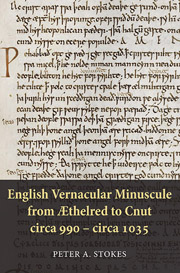Book contents
- Frontmatter
- Contents
- Lists of Tables
- Lists of Figures
- Lists of Plates
- Acknowledgements
- List of Abbreviations
- Introduction
- 1 Background
- 2 Attributions of Origin
- 3 Scribal Change in Bookhands and Charters: The ‘Tall and Narrow’ Hands
- 4 Scribal Continuity in Bookhands and Charters: The ‘Square-Influenced’ Hands
- 5 Glosses and Scribbles
- Conclusion: Change and Continuity in Early English Vernacular Minuscule
- Appendix. List of Scribal Hands
- Glossary
- Bibliography
- Index of Manuscripts and Charters
- General Index
- Plate section
1 - Background
Published online by Cambridge University Press: 05 April 2014
- Frontmatter
- Contents
- Lists of Tables
- Lists of Figures
- Lists of Plates
- Acknowledgements
- List of Abbreviations
- Introduction
- 1 Background
- 2 Attributions of Origin
- 3 Scribal Change in Bookhands and Charters: The ‘Tall and Narrow’ Hands
- 4 Scribal Continuity in Bookhands and Charters: The ‘Square-Influenced’ Hands
- 5 Glosses and Scribbles
- Conclusion: Change and Continuity in Early English Vernacular Minuscule
- Appendix. List of Scribal Hands
- Glossary
- Bibliography
- Index of Manuscripts and Charters
- General Index
- Plate section
Summary
The Medieval Context
The roots of English Vernacular minuscule lie in script practised very much earlier. The Insular system of script, as defined and characterised by Julian Brown, was one demonstrably practised in Ireland and England, probably also in Wales and perhaps Scotland; at least in Brown's conception of it, it lasted until the Viking incursions of the mid-ninth century. At this time Anglo-Saxon scribal practices seem to have collapsed: a dramatic change has been observed in the quality of both the script and the Latinity of charters from about the 850s, and this correlates closely with claims attributed to King Alfred that education had largely ceased owing to the extreme pressures of the time. Although the details have been argued, it does seem that the stability and reforms introduced by Alfred towards the end of the ninth century brought with them a gradual improvement in standards of writing, resulting ultimately in the distinctive Square minuscule script which characterises Anglo-Saxon charter and book production of much of the tenth century (and is distinctive of the so-called Late Celtic minuscule practised in Ireland and Wales).
- Type
- Chapter
- Information
- Publisher: Boydell & BrewerPrint publication year: 2014



